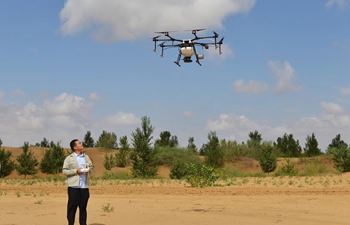MEXICO CITY, Aug. 8 (Xinhua) -- The renegotiation of the North American Free Trade Agreement (NAFTA) and tariffs imposed by the United States on imported auto parts are the main risks to Mexico's economy, financial group BBVA Bancomer said on Wednesday.
Although the trade talks were taking place on an optimistic note, NAFTA parties continue to disagree on key points of the agreement, the group's chief economist Carlos Serrano said in a report on the year's third quarter, titled "Situation Mexico".
"The variable financial risks are not internal, but instead come from what could happen with NAFTA and President (Donald) Trump's proposed tariffs," Serrano told reporters.
Mexico's change of government in December is not a risk factor, he said.
"The transition of government is not going to be a factor that could destabilize the financial variables. We believe the transition will continue to be orderly," he said.
President-elect Andres Manuel Lopez Obrador will take office on Dec. 1.
BBVA Bancomer has estimated an economic growth of 2.6 percent this year. Protectionist policies implemented so far by the United States have had a limited impact, but other measures being discussed could have severe consequences, according to the financial group.
GDP growth in the trade sector could fall to about 0.2 percent, if the United States steps up its protectionist measures, BBVA Bancomer said.
On May 23, Washington launched an investigation into whether importing automobiles and trucks poses a national security threat and would lead to tariffs similar to those imposed on steel and aluminum from Mexico and other countries.
In Mexico's case, Serrano said that during the past few months, the change in the prices of domestic assets has been a result of escalating trade tensions.
Moving forward, he thinks it is "difficult" for the Mexican economy to grow at a pace of 4 percent, as proposed by Lopez Obrador.
"If an unrealistic expansion scenario occurs, we could end up with a growing fiscal deficit," Serrano said.
"We saw it in 2013 and 2014, years in which the deficit grew because the budget was done based on an unrealistic growth scenario," he added.













